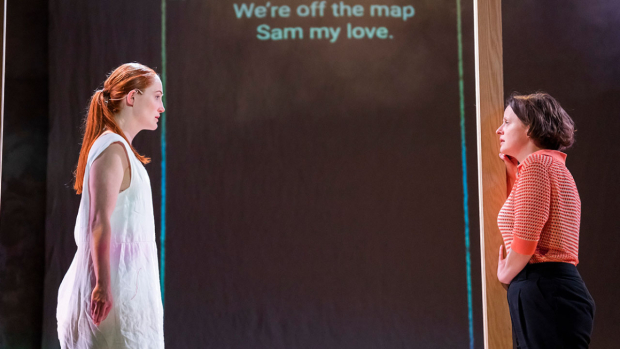”A Dead Body in Taos” at Wilton’s Music Hall – review

© Tristram Kenton
What is a life? Is it just the skin and bones of the human body? Or is it the experiences and memories of a life lived? These are the themes that David Farr explores in his new play A Dead Body in Taos currently stopping at Wilton’s Music Hall as part of a UK tour.
Sam has travelled from her home in the UK to identify the body of her 70 year-old Mother in the New Mexico town of Taos. It’s a mother-daughter relationship that has long since broken down with Kath having abandoned her daughter to live in “the quietest place on earth” following a mental breakdown. In the pocket of Kath’s dead body is a note, addressed to her daughter, with the vague message “Don’t grieve. I’m not here”.
Whilst in her self-imposed exile it transpires that Kath has been uploading all of her memories, feelings and thoughts to The Future Life research facility as part of their Life after Death program. Kath has chosen an image of her younger self from 1986, the year that she gave birth to her daughter, with which Future Life have created a 3D model of her that lives within a starkly illuminated frame. It appears that Kath lives on – despite there being a dead body. Farr’s script refers to her as Kath Cyborg – it’s all a bit Star Trek.
Rather than intelligently and emotionally exploring the ethics or indeed the psychological effects of all this, Farr instead chooses to spend too much time in flashback to Kath’s beginnings. Most of the first act follows the life of the radical and politically motivated Kath. She is a troubled young woman and an activist who hot-headedly leads anti-war and anti-capitalist protests – some with deadly outcomes. The treatment of her lovers and an angry reaction to a bizarrely out of place scene at a meditation commune all just make us like Kath less and less.
Gemma Lawrence’s Sam makes sturdy work of a daughter that has not felt the love of a Mother for most of her life – but we don’t see her grapple with the emotional torment anywhere near enough. As she spends more time with her virtual Mother it is fascinating to see them bond more closely than they ever had done in real life – I wanted to invest more time in exploring the possibilities of reconciliation and forgiveness.
Eve Ponsonby gives a fearless but abrasive performance as Kath that is high energy but low sensitivity – it is easy to see why Sam doesn’t hold much in the way of feelings for her. As her cyborg version, Kath comes close to humility and an expression of love towards the end, but Ponsonby retains her electronically monotone voice and prevents any kind of emotional connection.
It could be a beautiful exploration of grief and how our modern lives inhabit a digital world that leaves footprints behind forever. Is keeping an avatar version of your loved ones long after they have passed a comfort, or is it simply delaying the inevitable – is it more than anything, a barrier to the grieving process? They are all questions that frustratingly never get answered or even given room for much discussion and thought.










